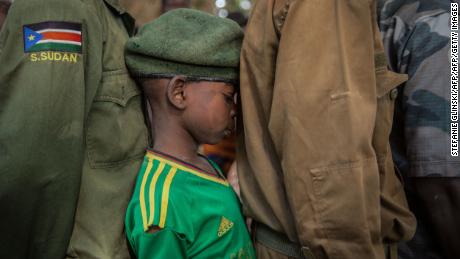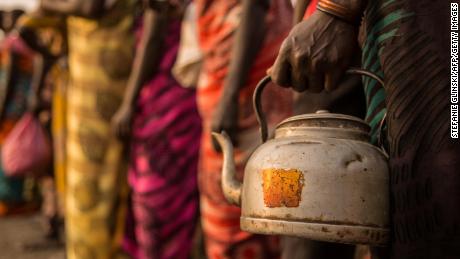Based on information compiled from legal professionals and government officials, Amnesty says the country has executed seven people, including one who was a child at the time of their offense, in 2018. This represents the highest number of executions since South Sudan became the world's youngest nation following independence in 2011, according to Amnesty International.Amnesty called the findings "extremely disturbing" and revealed worries about another 135 death row prisoners– including at least one child and a breastfeeding mother — who the group says were recently moved into facilities known for executions.Since South Sudan broke away from Sudan seven years ago, the number of people on death row has doubled to 342 prisoners, according to the rights group.In that time the courts have handed down the death sentence to at least 140 people and there have been at least 32 executions."It is extremely disturbing that the world's youngest nation has embraced this outdated, inhuman practice," said Joan Nyanyuki, Amnesty International's regional director, who said that other countries around the world are abandoning the death penalty."The President of South Sudan must stop signing execution orders and end this obvious violation of the right to life," she added.Multiple attempts by CNN to reach representatives of the South Sudanese government for comment were unsuccessful.According to the Amnesty report, four people, including two who were children at the time they committed the crimes for which they were convicted, were executed in 2017. The report also includes the story of a 16-year-old who was sentenced to death for a murder that he maintains was an accident. He was convicted and put on death row despite telling a judge that he was 15 at the time of the incident.International law prohibits the execution of prisoners who were under the age of 18 when the crime was committed, according to the International Bar Association."It is the ultimate cruel, inhuman and degrading punishment," Amnesty said in a press release. The escalating use of capital punishment is at odds with both regional and global trends. South Sudan and Somalia were the only countries in sub-Saharan Africa to execute prisoners in 2017, according to Amnesty.The South Sudanese government voted against a potential moratorium on the use of the death penalty at the UN General Assembly in 2016 and rejected recommendations to abolish its use.
 The country has been embroiled in civil conflict since 2013, with its civilian population paying a heavy price. South Sudan's president, Salva Kiir, signed a peace agreement with rebel leaders in September but it is not yet clear if the agreement will hold.In November attackers raped, beat and robbed more than 100 women and girls in northern South Sudan over a 10-day period, said aid agency Doctors Without Borders (MSF).And around 19,000 children have been forced to join the military and other armed groups, according to Unicef, the United Nations' children's charity. In April, 112 boys and 95 girls, some as young as 14, were freed at a special "laying down of arms ceremony" organized by the agency.
The country has been embroiled in civil conflict since 2013, with its civilian population paying a heavy price. South Sudan's president, Salva Kiir, signed a peace agreement with rebel leaders in September but it is not yet clear if the agreement will hold.In November attackers raped, beat and robbed more than 100 women and girls in northern South Sudan over a 10-day period, said aid agency Doctors Without Borders (MSF).And around 19,000 children have been forced to join the military and other armed groups, according to Unicef, the United Nations' children's charity. In April, 112 boys and 95 girls, some as young as 14, were freed at a special "laying down of arms ceremony" organized by the agency.
Original Article
Based on information compiled from legal professionals and government officials, Amnesty says the country has executed seven people, including one who was a child at the time of their offense, in 2018. This represents the highest number of executions since South Sudan became the world's youngest nation following independence in 2011, according to Amnesty International.Amnesty called the findings "extremely disturbing" and revealed worries about another 135 death row prisoners– including at least one child and a breastfeeding mother — who the group says were recently moved into facilities known for executions.Since South Sudan broke away from Sudan seven years ago, the number of people on death row has doubled to 342 prisoners, according to the rights group.In that time the courts have handed down the death sentence to at least 140 people and there have been at least 32 executions."It is extremely disturbing that the world's youngest nation has embraced this outdated, inhuman practice," said Joan Nyanyuki, Amnesty International's regional director, who said that other countries around the world are abandoning the death penalty."The President of South Sudan must stop signing execution orders and end this obvious violation of the right to life," she added.Multiple attempts by CNN to reach representatives of the South Sudanese government for comment were unsuccessful.According to the Amnesty report, four people, including two who were children at the time they committed the crimes for which they were convicted, were executed in 2017. The report also includes the story of a 16-year-old who was sentenced to death for a murder that he maintains was an accident. He was convicted and put on death row despite telling a judge that he was 15 at the time of the incident.International law prohibits the execution of prisoners who were under the age of 18 when the crime was committed, according to the International Bar Association."It is the ultimate cruel, inhuman and degrading punishment," Amnesty said in a press release. The escalating use of capital punishment is at odds with both regional and global trends. South Sudan and Somalia were the only countries in sub-Saharan Africa to execute prisoners in 2017, according to Amnesty.The South Sudanese government voted against a potential moratorium on the use of the death penalty at the UN General Assembly in 2016 and rejected recommendations to abolish its use.
 The country has been embroiled in civil conflict since 2013, with its civilian population paying a heavy price. South Sudan's president, Salva Kiir, signed a peace agreement with rebel leaders in September but it is not yet clear if the agreement will hold.In November attackers raped, beat and robbed more than 100 women and girls in northern South Sudan over a 10-day period, said aid agency Doctors Without Borders (MSF).And around 19,000 children have been forced to join the military and other armed groups, according to Unicef, the United Nations' children's charity. In April, 112 boys and 95 girls, some as young as 14, were freed at a special "laying down of arms ceremony" organized by the agency.
The country has been embroiled in civil conflict since 2013, with its civilian population paying a heavy price. South Sudan's president, Salva Kiir, signed a peace agreement with rebel leaders in September but it is not yet clear if the agreement will hold.In November attackers raped, beat and robbed more than 100 women and girls in northern South Sudan over a 10-day period, said aid agency Doctors Without Borders (MSF).And around 19,000 children have been forced to join the military and other armed groups, according to Unicef, the United Nations' children's charity. In April, 112 boys and 95 girls, some as young as 14, were freed at a special "laying down of arms ceremony" organized by the agency.
Original Article











